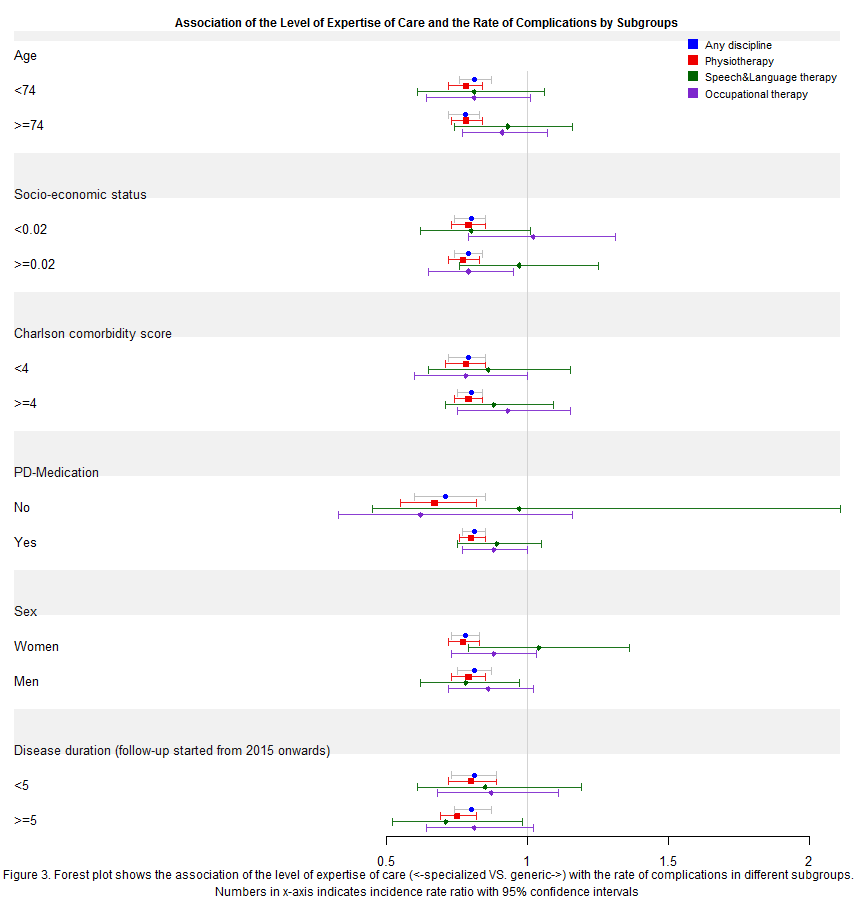Category: Allied Healthcare Professionals
Objective: To investigate discipline-specific effects of specialized Allied Health Therapy on the incidence of Parkinson’s Disease (PD)-related complications.
Background: Specialized physiotherapy has been shown to reduce complications and healthcare costs in Persons with PD (PwP). Insight on the effectiveness of specialized therapy across other disciplines remains scarce. Furthermore, it is unclear to what extent the effects of specialized allied health therapy vary across sociodemographic or clinical subgroups, are complication-specific, or are sustainable over longer intervals.
Method: We performed a retrospective, observational study using healthcare expenditure data of all insured PwP in the Netherlands between January 1, 2010 to December 31, 2018. We investigated associations between the level of expertise of Physiotherapy, Occupational therapy or Speech&Language Therapy and the incidence of PD-related complications. Therapists who were trained through the Dutch ParkinsonNet (a nationwide network of allied health therapists attracting higher caseload) were categorized as specialized, while the remaining therapists were categorized as generic. We used mixed-effects Poisson regression models with adjustment for sociodemographic and clinical characteristics.
Results: The population comprised 51,464 PwP. The mean age was 72.4 years (standard deviation 9.8 years) and 58% were men. During follow-up (median 3.3 years) 10,525 PD-related complications occurred. We observed inverse associations of specialized Physiotherapy (Incidence Rate Ratio of specialized vs. generic therapy (IRR)=0.79, 95% confidence interval[0.74-0.83]) and Occupational Therapy (IRR=0.88[0.77-1.00]) with the incidence of complications, while results were not statistically significant for Speech&Language Therapy (IRR=0.88[0.74-1.04]). Results were largely consistent across subgroups and over longer intervals. In complication-specific analyses, the inverse association of specialized Physiotherapy was restricted to orthopedic injuries (IRR=0.78[0.73-0.82]), while the inverse association of specialized Speech&Language Therapy was restricted to pneumonia (IRR=0.70[0.53-0.93]).
Conclusion: This study will guide the development of personalized rehabilitation in PwP and may serve as a template for specialized allied health therapy interventions in countries other than the Netherlands, or for other neurological diseases.
References: Ypinga JHL, de Vries NM, Boonen L, Koolman X, Munneke M, Zwinderman AH, et al. Effectiveness and costs of specialised physiotherapy given via ParkinsonNet: a retrospective analysis of medical claims-data. The Lancet Neurology [Internet]. 2018 Feb; 17(2):[153-61 pp.].
To cite this abstract in AMA style:
AH. Talebi, JHL. Ypinga, M. Munneke, B. Bloem, SKL. Darweesh. Unraveling the Potential of Specialized Allied Health Therapy in Parkinson’s Disease [abstract]. Mov Disord. 2022; 37 (suppl 2). https://www.mdsabstracts.org/abstract/unraveling-the-potential-of-specialized-allied-health-therapy-in-parkinsons-disease/. Accessed July 5, 2025.« Back to 2022 International Congress
MDS Abstracts - https://www.mdsabstracts.org/abstract/unraveling-the-potential-of-specialized-allied-health-therapy-in-parkinsons-disease/

